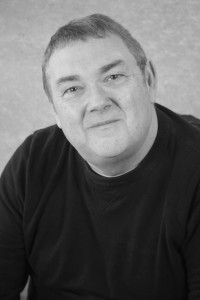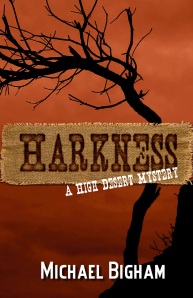
Raised in the mill town of Prineville in Central Oregon beneath blue skies and rimrocks, Michael Bigham attended the University of Oregon and during his collegiate summers, fought range fires on the Oregon high desert for the Bureau of Land Management. He worked as a police officer with the Port of Portland and after leaving police work, obtained an MFA degree in Creative Writing from Vermont College. Michael lives in Portland, Oregon with his wife and daughter. Harkness is his first novel.
Q: Thank you for this interview, Michael. Can you tell us what your latest book, Harkness: A High Desert Mystery, is all about?
Harkness occurs during the summer of 1952 on the high desert in Central Oregon. Up to this point, the worst crime Matt Harkness, the local sheriff, has faced is two drunk cowboys playing quick draw out behind the local tavern. But now two star-crossed teen-age lovers are murdered. It’s up to Harkness to bring whoever has killed them to justice. His task is complicated by the secretive nature of the townspeople. Harkness is privy the local’s secrets and he must decide which secrets to reveal to catch the murderer.
Q: Can you tell us a little about your main and supporting characters?
Matthew Harkness is a man formed by violence. His father died when Harkness was eight and his mother physically abused him. He left home at the age of 12, drifted around for a while and ended up living in Barnesville with his uncle. Drafted into the military during World War II, he fought in jungles New Guinea and bears both physical and emotional scars from the conflict. He strives to put aside his past, but the recent murders test his resolve. The great love of his life is Kate Barnes. The complication is that Kate is married to the local judge and most powerful man in the county, Porter Barnes.
Kate Barnes is a bright woman from local farming stock. She loves Harkness but questions his ability to commit to a long-term relationship. Like many women in the post-war era, she wants to be more than just a housewife.
The town of Barnesville is named after one of Porter Barnes’ fore bearers. He wields the real power in the county. He loves Kate in his own way, but his real passion is reserved for another.
 Q: Do you tend to base your characters on real people or are they totally from your imagination?
Q: Do you tend to base your characters on real people or are they totally from your imagination?Like most writers, my characters are a mix of my imagination and bits of real people. I’ve found that if I focus too much on real people, I’m limited on what I can do with my descriptions and characterization.
Q: Are you consciously aware of the plot before you begin a novel, or do you discover it as you write?
I knew that Harkness would have to solve a murder and I had a vague awareness of the setting and circumstances of the climax. The journey between the two points was one of discovery and exploration.
Q: Your book is set in Barnesville. Can you tell us why you chose this city in particular?
I grew up in a small Central Oregon lumber and ranching town called Prineville. Though my characters aren’t based all that much on reality, the town of Barnesville is. Some folks may not think my depiction is flattering in spots, but I think it’ important for a writer to give the reader a true sense of a place, warts and all.
Q: Does the setting play a major part in the development of your story?
Absolutely. During college, I spent my summers fighting range fires on the high desert 50 miles east of nowhere near the little village of Paulina. I came to love the stark nature of the country. It’s a landscape of juniper, sagebrush and rimrock. There you’ll find lonely vistas and fertile valleys. It’s still unspoiled by progress. If you have a chance, visit there before it all disappears. As a writer, I find that landscape plays a crucial role in developing my narrative.
Q: Open the book to page 69. What is happening?
A: Sheriff Matt Harkness has just returned to his office after interviewing a suspect in the murder of a young woman. There are two people in custody in his jail; Ronnie Gearhart, who beat up his father when the man attacked his mother and Thomas Stewart, an African-American man, who by bad fortune happened to be driving through the all-white town of Barnesville and was arrested by another peace officer as a suspect in the murder. Harkness knows he will have to find the real murderer to clear Stewart.
Q: Can you give us one of your best excerpts?
A: Early in the book, Sheriff Matt Harkness drives up into the hills to tell Ethan Kelly his daughter is missing.
Ethan Kelly had his head stuck under the hood of a military deuce and a half converted into a hay truck. The flatbed had been cobbled on in some local garage, but the job looked good enough. If he was surprised to see me, he didn’t show it, just wiped his hands on his overalls and offered me a drink of water. He was a smallish, slender man with bad teeth, sun-blackened arms, and the odor of three or four day’s hard labor about him. I told him I was here about his daughter, and he got a long, sad look on his face. He invited me into the line shack to get out of the sun. “A man shouldn’t hear bad news in the sun.”
I told him it wasn’t as bad as all that. I didn’t add the ‘yet’ part. Maybe I didn’t want to admit to that part myself.
The line shack consisted of a single room about as big as the Kelly home. Light came from kerosene lamps, and there was a hand pump next to the sink for water. As usual with those old places, the crapper was out back, and I got to thinking about how and where Elias Warner got bit by the black widow spider.
Kelly settled into warming up the morning coffee while I told him his daughter was missing. His shoulders sagged at the news. “I was just going to have beans for supper,” he said. “Care to join me?”
I’d had more than my share of beans growing up and wasn’t partial to them, but I wasn’t one to let a man eat alone when he was in the sorrows, so I said yes. The line shack creaked in the afternoon wind while Kelly opened a can of pork and beans and dumped it into a battered saucepan. “Virginia’s a good girl,” he said. “A pretty gal, but smart, too.”
“That’s what folks tell me.” My comment seemed to please Kelly a bit. “They also tell me she was seeing the McIntyre boy. What about that?”
“Her mama told her not to give it up too soon, not to get knocked-up and ruin her life. Us folks ain’t got much in this life other than our reputation, she tells her.” He handed me a plate of beans and a cup of Joe. “Esther seems to think that graduating from high school is important.” He shook his head as if he wasn’t sure he agreed. “Hope you don’t mind cowboy coffee. Last line rider up here took off with the percolator. Now we have to boil the bejesus out of the grounds. Got some sugar if you want it.”
“Black’s fine.” The stuff looked like something you’d swab onto a flat roof. “Joey McIntyre,” I prompted. “Tell me about the boy and your daughter.”
Kelly allowed that he didn’t know much about his daughter’s recent dealings with McIntyre, as he’d been over in Willamette Valley for most of the summer roofing and doing pickup labor. “The money’s good enough, but too many people in the Valley.” So he’d asked Dirk Redmond if he might have a job on one of his ranches, and Dirk said, “Hell, yes. Come on back.” So he did. “Esther, she frets about Virginia, sneaking out all hours of the night with God knows who. Virginia was a hard girl to handle, being so smart and all, and Esther had her hands full taking care of all them kids and doing seamstress work on the side. Maybe we should take a switch to the child, but neither of us has the heart for it.”
Kelly sighed and took a couple bites of beans. “Maybe we figured she’d grow out of her wildness. If only…” He sipped his coffee and spilled some on his t-shirt. “Shit,” he said, brushing himself. He sat there in a straight-backed chair, mouth set in a tight line, and stared at the bare wall as if I wasn’t there. Did he know or intuit something I didn’t?
He roused himself and told me that Virginia wanted to attend beauty school. “She’s got the gumption to do it. Fucking boys anyway. Sniffing around her like bird dogs.”
I asked him if he knew the names of anyone else she might have seen other than Joey McIntyre. He told me he wouldn’t be surprised if she had, but he didn’t know who, and he didn’t know where she might be.
He seemed pretty much talked out by then, so I asked him if he needed anything with the hay truck being broke and all, but he said “Nope.” I left him sitting in his chair with a stained t-shirt and a plate of cold beans.
Q: Thank you so much for this interview, Michael. We wish you much success!
A: Thanks. I really appreciate the opportunity. You have a great blog. If you have a chance, check out my blog at www.michaelbigham.com
